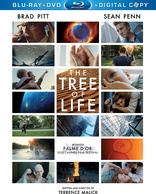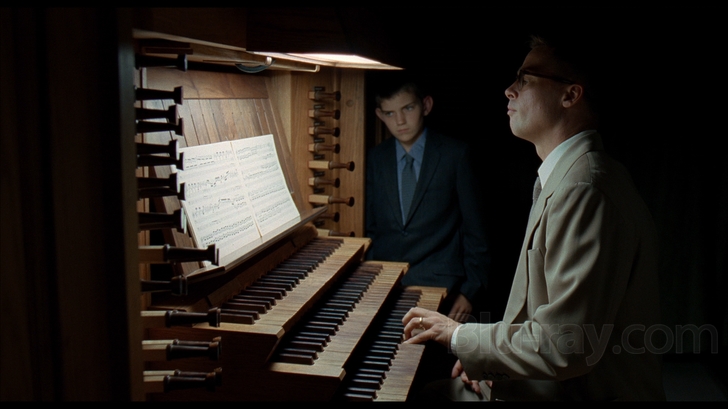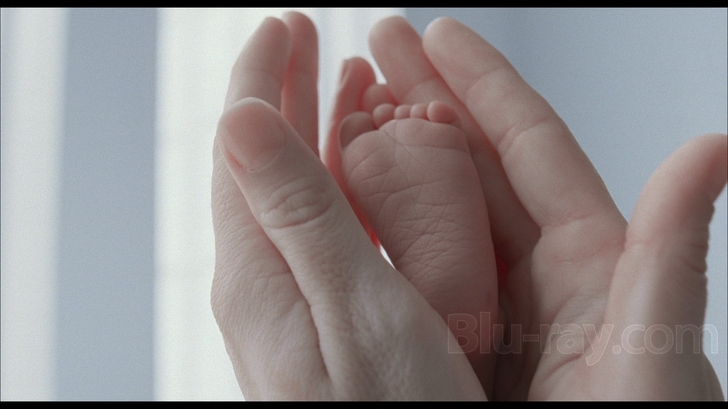The Tree of Life Blu-ray Movie
HomeThe Tree of Life Blu-ray Movie 
Blu-ray + DVD + Digital Copy20th Century Fox | 2011 | 139 min | Rated PG-13 | Oct 11, 2011

Movie rating
7.7 | / 10 |
Blu-ray rating
| Users | 3.9 | |
| Reviewer | 5.0 | |
| Overall | 4.1 |
Overview
The Tree of Life (2011)
The impressionistic story of a Midwestern family in the 1950's following the life journey of the eldest son, Jack, through the innocence of childhood to his disillusioned adult years as he tries to reconcile a complicated relationship with his father. Jack finds himself a lost soul in the modern world, seeking answers to the origins and meaning of life while questioning the existence of faith.
Starring: Brad Pitt, Jessica Chastain, Sean Penn, Tye Sheridan, Fiona ShawDirector: Terrence Malick
| Drama | Uncertain |
| Period | Uncertain |
| Surreal | Uncertain |
| Coming of age | Uncertain |
| Imaginary | Uncertain |
Specifications
Video
Video codec: MPEG-4 AVC
Video resolution: 1080p
Aspect ratio: 1.84:1
Original aspect ratio: 1.85:1
Audio
English: DTS-HD Master Audio 7.1 (48kHz, 24-bit)
English: Dolby Digital 2.0 (224 kbps)
Subtitles
English SDH, Spanish
Discs
50GB Blu-ray Disc
Three-disc set (1 BD, 2 DVDs)
Digital copy (on disc)
DVD copy
Packaging
Slipcover in original pressing
Playback
Region A, B (locked)
Review
Rating summary
| Movie | 4.5 | |
| Video | 5.0 | |
| Audio | 5.0 | |
| Extras | 2.0 | |
| Overall | 5.0 |
The Tree of Life Blu-ray Movie Review
All things shining, emphasis on "all."
Reviewed by Casey Broadwater October 11, 2011Director Terrence Malick is indisputably the Thomas Pynchon of moviemaking; he’s legendarily press-shy, he doesn't put out new work often, and when he does, his audience expects a weighty artistic statement, something dense to parse, puzzle over, and appreciate during the long wait for the next one. Although we might not be waiting too long this time around—Malick’s upcoming film, The Burial, is now reportedly in the editing stage—his most recent opus, the Palm d’Or-winning Tree of Life, is his grandest cinematic declaration yet, a flawed-but-monumental effort that takes us from the birth of the cosmos and guides us through the very end of time. Somewhere in between, it hones in on a boy growing up in Texas during the 1950s, competing for the affections of his angelic mother with his domineering, show-no-emotion father. It’s a narratively elliptical film of great ambition, and like all art that strives for the transcendent, it has and will be accused of being pretentious, slow, symbolically bloated, a waste of time, or worse. Don’t heed the haters. It’s not quite the all-encompassing masterpiece Malick wants it to be, but if you’re drawn to high-concept cinema or auteur visions of the world, The Tree of Life is an unparalleled experience. This is the kind of film that will still be watched fifty years from now with the same awe, feeling, and admiration.

Jack
The final snatch of voiceover dialogue in Terrence Malick’s philosophical war epic, The Thin Red Line, is a precursor to the unanswerable metaphysical questions the director tackles in The Tree of Life: “Darkness, light. Strife and love. Are they the workings of one mind? The features of the same face? Oh, my soul. Let me be in you now. Look out through my eyes. Look out at the things you made. All things shining.” The Tree of Life is, in essence, about the gloriousness of all things, from the entire spectrum of human experience to the vast span of time between the beginning of the cosmos and the Earth’s fiery demise, and it frames this contemplation on everything-that-is in a series of dialectic oppositions. The film compares the literally universal to the specific drama of a single family, somewhere in Texas during the 1950s, and contrasts the concepts of “father” and “mother” as embodiments, respectively, of survival-of-the-fittest conflict and transcendent love.
Played by Brad Pitt in one of his most nuanced performances yet, the father here is Mr. O’Brien, a stern, Eisenhower-era breadwinner who admonishes his three young sons with go-get-’em advice—“It takes fierce will to get ahead in this world”—while their mother (willowy redhead Jessica Chastain) stands as a model of care and warmth and forgiveness. In an early voiceover—Malick’s characteristic device for poetically expressing his themes—Mrs. O’Brien utters what might as well be the film’s thesis statement: “There are two ways through life, the way of nature and the way of grace; you have to choose which one you’ll follow.”
Grace, in The Tree of Life, is a candle flickering in the overwhelming blackness of an indifferent natural universe. The world simply isn’t fair, and the film’s first trauma comes when the O’Briens receive a telegram stating—we assume, no direct confirmation is given—that one of their sons has died in Vietnam. Mother is crushed, Father juts out his chin and bears it, and the film jumps forward to the present day, where the couple’s eldest son, high-powered architect Jack—played in adulthood by Sean Penn—wakes up on the anniversary of his brother’s death, lights a candle in his memory, and wanders depressed through an urban forest of metal and glass skyscrapers. Clearly, he’s heeded his father’s advice and found success, but he seems distrustful of it. (“The world’s gone to the dogs. People are greedy and just keep getting worse.”) Though he’s definitely his father’s son, he has his mother’s sensitivity too, and the sight of a newly planted tree in the middle of his office park prompts a flashback of truly epic proportions, taking us all the way to the dawn of time and then working forward to Jack’s childhood in the 1950s.
Malick compresses the history of the universe and the evolution of life on Earth into a stunning, nearly 20-minute sequence that’s scientifically accurate and aesthetically beautiful. It’s something like the kind of IMAX movie you’d see in a natural history museum, but considerably more high-brow, immaculately composed and set to bombastic classical music. Stars are born and galaxies cluster. Earth takes shape from a cataclysm of asteroid bombardment and volcanic eruption. Single cells become ocean life, which inevitably takes to land. We’re even shown the possible origins of empathy in a scene with a dinosaur predator who seemingly spares his injured prey. (That said, this scene is one of precious few in the film that just doesn’t work for me. The CGI dinosaurs look too fake, especially next to the practical effects, which were engineered by VFX legend Douglas Trumbull, who came out of a thirty-year retirement to work on the movie.) You may have seen similar origin-of-life-on-Earth material on the Discovery Channel, but Malick evokes the grandeur of the universe, the comparative smallness of mankind, and the sheer wonder that we’re here on this spinning blue dot at all in a way that we haven’t seen since Kubrick pulled off a similar cinematic feat in 2001: A Space Odyssey.
But the similarities, while notable, stop there. Where 2001 was a work of icy intellect, The Tree of Life is warmer and more intuitive. It’s damned near impossible to avoid the word “poetic”—the term most overused to describe Malick’s languid camerawork and stream-of-consciousness narration—so I’ll just give in. The film is a poem, maybe even a prayer, albeit the contemplative sort, more of a meditation on existence and creation than a supplication to a higher power. It’s also a memory play, an unconventional recollection of childhood, and in this it has more in common with Andrei Tarkovsky’s semi-autobiographical masterpiece, The Mirror. The two films back to back would make one helluva thematically-linked double feature. Malick even stages what has to be an homage to Tarkovsky’s fondness for images of levitation, sending Jessica Chastain twirling through the air in the front yard in one blink-and-you’ll-miss-it shot. These impressionistic, metaphorical touches abound; elsewhere, Chastain is portrayed as Sleeping Beauty in her glass coffin, her skin like alabaster, and the film ends with a symbolic vision of the afterlife that, while arguably the weakest aspect of the film thematically, is inarguably beautiful.
Tree of Life is at its best when it moves through the stages of Jack’s DDT-clouded 1950’s coming-of-age, from infant innocence through oedipal pre-teen rebellion. Played with non-actor realism by Hunter McCracken, Young Jack has a boyhood so archetypal it feels at once personal—with some elements clearly referenced from Malick’s own past—and stirringly mythic, the boy-to-man arc of every male to have ever walked the planet. He roughhouses with soft-spoken middle child R.L. (Laramie Eppler)—youngest sibling Steve (Tye Sheridan) remains frustratingly peripheral to the story—and leads a gang of curiously cruel neighborhood kids as they tie a frog to a bottle rocket. (“Did it go to the moon?!”) He feels the first pangs of lust, crushing on a dark-haired classmate and later stealing a neighbor lady’s underwear, and realizes the finality of death when a friend drowns at the public pool. But most affecting is Jack’s subconscious struggle between the influence of his grace-radiating mom—Chastain is perfectly ethereal here—and his disciplinarian dad, a failed musician turned two-bit inventor who can’t sell his patents and misses out on the American Dream. “Toscanini once recorded a piece 65 times,” Mr. O’Brien tells Jack at one point, speaking of the famously intense Italian conductor. “You know what he said when he finished? It could be better.” The same could be said of The Tree of Life, but it’s nonetheless exciting to see Malick trying to hone ever closer to the same universal Truth-with-a-capital-T in each successive film.
The Tree of Life Blu-ray Movie, Video Quality 

If Tree of Life's director of photography Emmanuel Lubezki (Children of Men) doesn't win the Academy Award next year for best cinematography, then something is seriously awry in Hollywood. Whatever you think about the content of the film, you can't say it isn't staggeringly beautiful from start to finish. It usually doesn't take me very long to take screenshots for these reviews, but with Tree of Life I was faced with a gorgeous, desktop wallpaper-worthy high definition image in nearly every frame. (As a testament, I've included 40 screengrabs, rather than our standard 20, in the screenshots section.) And other than the fact that I noticed two or three tiny white specks on the print over the course of nearly two and a half hours, I can't find any real fault with the 1080p/AVC-encoded, 1.85:1-framed picture Fox has assembled for this Blu-ray release. Shot predominately on 35mm, with some of the "evolution" scenes filmed using IMAX-ready 65mm cameras, the film retains it's natural grain structure and integrity here, with no visible evidence of DNR or edge enhancement. You may notice that grain is a bit heavier than it would be in a more glossy film, but this is a product of the way Tree of Life was shot--on location and almost entirely with natural lighting, which necessitates "faster" film stock. With this in mind, clarity is excellent. Fine detail is easily visible in the actors' faces, and the period clothing is wonderfully defined in closeups. Any softness seems due to the fact that the film was predominately shot using darting, sweeping Steadicam movements, which means focus isn't always precise. What impresses most is the rich, painterly color palette; everything looks realistic but amplified, poeticized, with great use of light and shadow and the balanced contrast to back it all up on Blu-ray. Black levels are deep without putting stress on shadow detail, and there are no clipped highlights or general overexposure. The encode is solid too, with no overt compression artifacts or other troubles. This will definitely be one of, if not the, best-looking releases of the year.
The Tree of Life Blu-ray Movie, Audio Quality 

You know you're in for a true audio experience when a disclaimer pops up before the movie begins stating that the filmmakers suggest you should keep the volume loud. Malick has always used sound as a thematic signifier--especially in The Thin Red Line and The New World--and Tree of Life is no different, featuring a lossless DTS-HD Master Audio 7.1 surround track that's thoughtfully designed, a perfect balance of the powerful and the delicate. As you can imagine from a film that depicts the beginning of the cosmos, the end of the Earth, and the general power of nature by way of volcanic explosions and pounding waterfalls, the subwoofer gets plenty of chances to rumble and throb. But the track also excels in the realism of its quieter moments--the sound of waves and gulls squawking in the rear channels, wind rustling through curtains and leaves and tall grass, crickets see-sawing the night away. Each location has its own sense of ambience and acoustics. Throughout, voices are clear and easy to understand, both the interior narration and the dialogue between characters. And then, of course, there's the epic soundtrack, which features original music by Alexandre Desplat--who has most recently done scores for Harry Potter and the Deathly Hallows and The King's Speech--along with nearly forty classical pieces, from piano interludes to full-blast operatic requiems. The film is wall-to-wall music, and it all sounds wonderful here-- dynamic, rich, and expressive. Follow the disclaimer's instructions and crank your receiver up a few notches past your usual listening levels; you'll definitely appreciate the additional volume.
The Tree of Life Blu-ray Movie, Special Features and Extras 

The lone special feature of note on the disc is the Exploring the Tree of Life behind-the-scenes piece (1080p, 29:56), but thankfully it's a good one, including substantive interviews with the film's producers and stars, along with production designer Jack Fisk, costume designer Jacqueline West, cinematographer Emmanuel Lubezki, and composer Alexandre Desplat. The notoriously press-shy Malick is nowhere to be seen--as expected--but David Fincher and Christopher Nolan show up to discuss the influence that the director has had on their own work. The only only other entry under the "Extras" tab is the film's theatrical trailer (1080p, 2:08), which is a brilliantly cut example of editing that sells the film perfectly.
The Tree of Life Blu-ray Movie, Overall Score and Recommendation 

So much more could be written—and that's the mark of a truly great movie—but I'll leave it at this: The Tree of Life is the best new film I've seen so far this year. It's not for everyone, but if you're patient and appreciate the very idea of ambitious, high-concept cinema, this piece of poetic/philosophical gristle will give you plenty to chew on until Malick's next film comes out. It also makes for a superlative Blu-ray experience, with a striking high definition and pristine lossless audio. Highly recommended!
Similar titles
Similar titles you might also like

Paris, Texas 4K
1984

The Master
2012

Moonlight 4K
2016

Wonder Wheel
2017

Roma
2018

Manchester by the Sea
2016

Days of Heaven 4K
1978

Boyhood
2014

Beasts of the Southern Wild
2012

Flashbacks of a Fool
2008

To the Wonder
2012

Eternal Sunshine of the Spotless Mind
2004

George Washington
2000

The 400 Blows
Les quatre cents coups
1959

Revolutionary Road
2008

King of the Hill
1993

Waves
2019

How Green Was My Valley
Fox Studio Classics
1941

Fences
2016

Wildlife
2018
